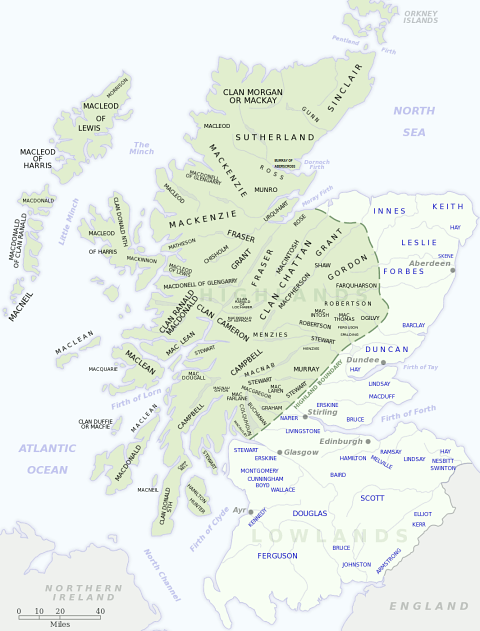
Motto: Buaidh no bas (Victory or death)
Historic Seat: Kisimul Castle
District: Hebrides
Associated Surnames: MacGugan, MacNeilage, MacNeiledge, MacNeilly, Neal, Neill, Nelson
Associated Tartans:
Early MacNeil Genealogy and History:
(Excerpt from "The Scottish Clans and Their Tartans", James Grant, 1906)
The MacNeil Clan was divided into two septs – those of Gigha, and others of Barra, two islands off the coast of Argyll.
The name of MacNeil first appears in a charter by Robert I of lands in Wigton to John, son of Gilbert MacNeil; but the oldest charter to the name for the Isle of Barra - confirmatory of one from Alexander, Lord of the Isles - is dated 1427, and is granted to Gilleonon, son of Roderick, son of Murchard, the son of Neil. The Gigha branch were, so far back as 1472, keepers of the Castle of Swen, in North Knapdale under the Lords of the Isles.
In recent times the MacNeils of Barra have always been held to represent the chiefs of the clan.
Martin, in his "Historical Account of the Isles," says that MacNeil of Barra can produce evidence for thirty-six generations of his own family as possessors of that island, besides a great many charters which were not legible.
As regards Gigha "Neil MacNeil," says Logan, "sold to James MacNeil the lands of Gigha, with the Toschadoirach of Kintyre," but gives no date for the transaction, in quoting "Caledonia."
The MacNeils of Barra interred their dead in the Chapel of St. Barr, whose image, covered with linen, in the form of a shirt, stood on the altar in Martin's time.
In the Roll for 1587 we have the name of Roderick MacNeil of Barra. Having seized an English ship in the reign of James VI, Queen Elizabeth complained of it as an act of piracy, and Roderick was summoned to Edinburgh to answer for his conduct; but he either despised or refused to obey the royal citation. At length he was taken prisoner by a stratagem of MacKenzie of Kintail.
He was conveyed to Edinburgh and tried for his life. Barra was forfeited and given to Kintail, who restored it to him on condition of holding of him and paying him sixty merks of feu-duty. Sir James MacDonald of Slate married one of Kintail's daughters, when the superiority of Barra was given as part of the lady's dowry, and it now continues with Lord MacDonald.
In 1650, among the "Colonells of Horsse," for the Scottish army in this year, before Worcester,1 curiously enough, we find the name of MacNeil of Barra.
"MacNeil of Tainish," says Auchmar in 1775, "the next principal person of this name, resides in Knapdale, in which are also MacNeil of Gallochoil and Tarbart. There is also another gentleman of the name Laird of the Isle of Colonsay, once the property of the Macaphies" – i.e., MacPhees.
The MacNeils of Colonsay, an island of the Hebrides, ten miles in length by three in breadth, are descended from a younger son of the MacNeils of Arichonan, who acquired it from the family of Argyll in the reign of James VI. Of this family, the two most dintinguished were Duncan, son of John of Colonsay, and his brother, Sir John. Duncan died on the 1st February 1874.
The latter, the Right Hon. Sir John MacNeil, third son of John MacNeil of Colonsay, was born in 1795, and in 1831 was Envoy at the Court of Persia, where he received the Order of the Lion and Sun, and was made K.C.B.2 in 1839. During his residence in the East he became thoroughly master of the habits, policy, and resources of the Asiatic nations. In 1844 he was appointed to be head of Scottish Poor Law Board. He became an honorary D.C.L.3 of Oxford; LL.D.4 of Edinburgh; and wrote "Progress and Position of Russian in the East to 1854." Latterly he resided long at Granton House.
Another member of the clan, many of whose songs are familiar among our peasantry, and whose chequered life was portrayed by himself in a novel entitled, "The Memoirs of Charles Macpherson" was Hector MacNeil, author of "Mary of Castle Cary," "Come under my Plaidie." He travelled in the East and West Indies. He was author of several, now forgotten, novels, but will be always best known by his songs for the people.
He was for a time editor of the "Scots Magazine," and died at Edinburgh on the 15th July 1818.
(End excerpt)
Next page: Clan MacPherson
Footnotes:
1 The Battle of Worcester (1651): The Battle of Worcester was fought on 3 September 1651 at Worcester, England and was the final battle of the English Civil War. Cromwell's army defeated King Charles II's army, of whom the vast majority were Scottish. Read more about the Battle of Worcester at Wikipedia.
2 K.C.B.: Knight Commander, The Most Honourable Order of the Bath. Read more about the Order of the Bath at Wikipedia.
3 D.C.L.: Doctor of Civil Law
4 LL.D: Doctor of Law

Distribution of Scottish clans and families
View larger map at Wikimedia Commons

Browse the Clan MacNeil Tartan Collection with home decor, personal accessories, crafting, paper products, and more.

Browse the Clan MacNeil Dress Tartan Collection with clothing, home decor, accessories, electronics cases, and more.

Clan MacNeil Postcard: Digitally cleaned and enhanced vintage illustration with tartan border.